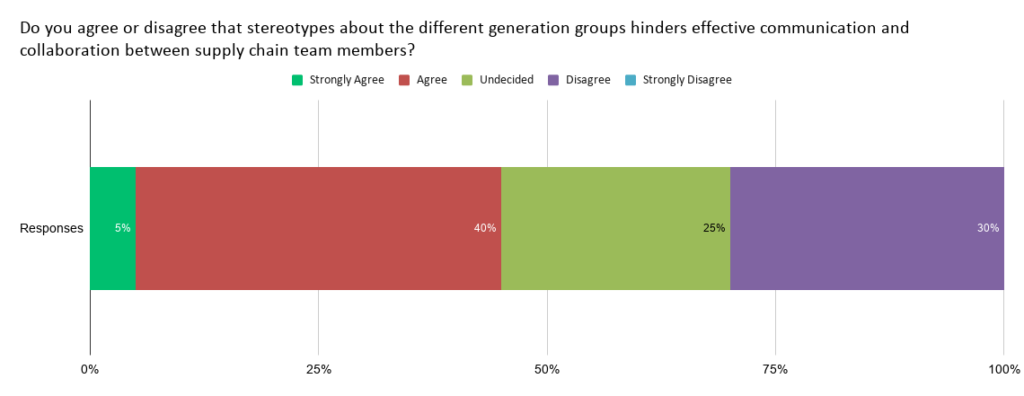Generation stereotypes exist, and as the authors of a Harvard Business Review article state, “these beliefs can get in the way of how people collaborate with their colleagues, and have troubling implications for how we people are managed and trained.”
So, last September we asked our Indago members, “Do you agree or disagree that stereotypes about the different generation groups hinders effective communication and collaboration among supply chain team members?”
(Almost half of our member respondents (45%) are from the Generation X group, with the balance belonging to the Baby Boomer (30%) and Millennial (25%) generations.)
A greater percentage of the respondents agreed that stereotypes about the different generations hinders effective communication and collaboration between supply chain team members compared to those who disagreed (45% vs. 30%). However, a relatively large percentage of the respondents (25%) were undecided.

“I think the stereotypes or assumptions about the generational groups are often wrong,” said one respondent. “When you dig a little deeper you find that every individual is shaped by way more than the time period they were born. It’s critical that we as leaders get to know who we work with on more than a surface level to avoid falling into the trap of forming opinions based on age alone.”
Another respondent put it this way: “I’ve learned from people who are older and more experienced than me, as well as from those who are younger than me. Both groups provide different insights and experiences. Embracing these differences helps you grow.”
Here are some other value-added comments from our Indago members, who are all supply chain and logistics professionals from manufacturing, retail, and distribution companies:
“Us older generations are often stuck in ‘this is the way we have always done it’ mindset. In general, we have to be open to improvement opportunities suggested by the younger age groups, especially in the areas where we can do a better job of leveraging information technology.”
“As a Millennial in the typical FMCG supply chain, I report directly to a Gen X manager and [he/she] reports to a Boomer supply chain/operations director. Yes, there could be differences in terms of technological affinities, but the older generations have experienced many things that we as Millennials have yet to [experience]. I think all generations would benefit from working with one another as long as they all keep an open mind and accept that learning will never cease.”
“Being from what I consider the ‘old school,’ the way I communicate with younger people is different from the way I communicate with my generation. The younger generation is more to the point and graphical. I guess they are more visual since they grew up with video games and such. The younger generation is also much more virtual receptive.”
“Team-building activities are extremely important in developing understanding. A shared meal goes a long way. I use assigned seats and make sure that people who don’t know each other well are put together. Work with sub-groups. Make sure everyone feels valued and provides input.”
The bottom line is that each group can learn a lot from each other. One strategy to get past the stereotypes and create a more unified team is to emphasize shared goals. As the authors of the HBR article explain, “By doing so, both older and younger people can see themselves as part of the same team working toward the same outcome. Indeed, focusing on commonalities or a common direction can reduce perceptions of ‘us’ versus ‘them’ and can create or reinforce a sense of ‘we’.”
What do you think? Do stereotypes about the different generation groups hinder effective communication and collaboration among supply chain team members? What can you learn (or have learned) from colleagues older and younger than you? Post a comment and share your perspective!
Join Indago
Also, If you’re a supply chain or logistics practitioner from a manufacturing, retail, or distribution company, I encourage you to learn more about Indago and join our research community. It is confidential, there is no cost to join and the time commitment is minimal (2-5 minutes per week) — plus your participation will help support charitable causes like JDRF, American Logistics Aid Network, American Cancer Society, Feeding America, and Make-A-Wish.
You can also follow us on LinkedIn to stay informed of our latest research results and news.









